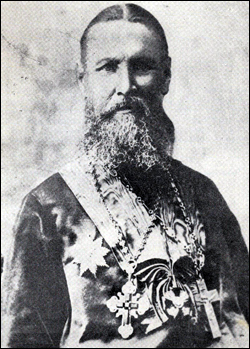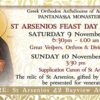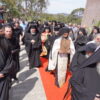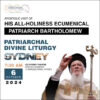
The Nineteenth Century in Russia was a time of considerable religious revival, and one of the most notable features of this revival was the way in which many thousands of ordinary people, of all classes and callings, flocked for spiritual advice – and, indeed, for temporal advice as well – to elders or startsi, who exercised in this way a remarkable ministry. But while all the startsi were monks – among whom special mention must be made of the greatest of them all, Saint Seraphim of Sarov (born 1759, died 1833, canonized 1903), and the several great spiritual directors of the monastery of Optino, the last of the famous spiritual teachers of imperial Russia was a married parish priest.
On the eve of the revolutionary upheaval, in which the Russian Church was to be tried in the fires of a persecution unequaled in extent or fury by anything the church had suffered in sixteen centuries, it was no monk, but an ordinary priest of an ordinary parish, no elder in some sheltered conventional retreat, but a man who had to find Christ in the hustle and bustle, – squalor and misery – of a great seaport, whom God sent as a sign to his children, to strengthen them for the horrors to come. The teaching of this man reflects him and his circumstances – it is as down to earth, yet as caught up to heaven, as the man himself: intensely practical, intensely demanding – and, inescapably, possible for all. Our Church celebrates the feast day of Saint John of Kronstadt on October 19.
The writings of the fathers, also, express the Mind, Word and Spirit, of the Holy Trinity, in which the spirit of the more spiritually advanced of mankind partakes.
lf you read worldly magazines and newspapers, and derive some profit from them, as a citizen, a Christian, a member of a family, then you ought still more and still oftener to read the Gospel, and the writings of the fathers; for it would be sinful in a Christian who reads worldly writings not to read divinely inspired ones. lf you follow the events of the outer world, do not lose sight of your inner world, your own soul: it is nearer and dearer to you. To read only worldly magazines and newspapers means to live only with one side of the soul, and not with the whole soul, or to live only by the flesh, and not by the spirit. Everything worldly will come to an end with the world itself. ‘And the world is passing away, and the lust of it; but he who does the will of God abides forever.’ (1 John 2:17)
Of those who do not read the gospel, I would ask: Are you pure, holy, and perfect, without reading the gospel? Is it not needful for you to look in this mirror? Or is it that your soul is so deformed that you fear to look upon your deformity? ‘They looked unto Him, and were lightened: and their faces were not ashamed.’ (Ps. 34:5)
As you are aware, man, in his words, does not die. He is immortal in them, and they will speak after his death. I shall die, but I shall speak even after my death. How many immortal words are in use among the living, which were left by those who have died long ago, and which sometimes still live in the mouths of a whole people! How powerful is the word, even of an ordinary man! Still more so is the Word of God: It will abide throughout all ages, ever living, ever acting.
Be firmly convinced that every word, above all those pronounced during prayer, is realisable, remembering that the author of the word is God the Word, and that our God Himself, worshipped in the Holy Trinity, is expressed by three words or names: the Father, the Word, and the Holy Spirit; that each and every word corresponds to a fact, and that every word can become fact and deed. Woe to those that speak idly, for they will have to answer for their idle speaking!
Every word of Holy Writ, every word of the Divine Liturgy, of the morning and evening services, every word of the sacramental rites and the other prayers, bears in itself the power corresponding to it, as does the sign of the life-giving cross. Such grace is present in every word of the Church on account of the personal incarnate Word of God, Who is the Head of the Church, dwelling in the Church. Besides this, every truly good word bears in itself the power corresponding to it, owing to the all-filling simple Word of God. How attentively and reverently, with what faith, must we therefore pronounce each word! For the Word is the Creator Himself, God, and through the Word all things were brought into existence.
‘Spiritual Counsels – St John of Kronstadt’ by W. Garsdone Grosbrooke




